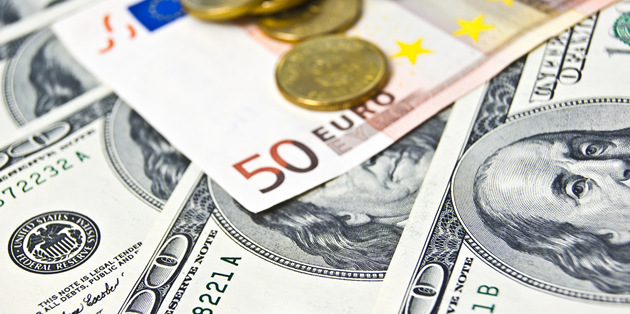Despite a slower start to the week Pound exchange rates recovered ground on the back of more positive UK data on Wednesday, with consumer confidence and house prices increasing in August.
- Nationwide House Prices showed unexpected rebound in August – Pound demand increased by reduced signs of negative Brexit impact
- Euro trended lower after discouraging German inflation report – Weaker inflationary pressure raised odds of further ECB easing
- Speculation continued over likelihood of imminent Fed rate hike – Higher US consumer confidence boosted US Dollar demand
- GBP EUR exchange rate forecast to extend gains on improved PMIs – Signs of recovery from post-referendum shock likely to encourage investors
US Dollar Boosted after Employment Data Surprised to the Upside
The US Dollar received a boost from a stronger-than-expected ADP Employment Change report, which pointed towards a further tightening in the labour market. This could bode well for Friday’s Non-Farm Payrolls data, although it has not been enough to knock the GBP USD exchange rate off its uptrend.
Towards the close of Wednesday’s European session the GBP EUR exchange rate was trending higher at 1.1770, while the GBP USD pairing was making gains in the region of 1.3118.
(Previously updated at 10:06 on 31/08/16)
Confidence in the US Dollar remains volatile, meanwhile, as markets waver over the odds of the Federal Reserve opting to raise interest rates before the end of 2016.
Pound (GBP) Exchange Rates Trended Higher on Increased UK House Prices
Following the bank holiday break the Pound (GBP) was offered no support by the news that UK consumer credit and mortgage approvals had both dropped in July. This suggested that confidence within the domestic economy was not quite as resilient in the wake of the referendum as markets had hoped. With the ultimate impact of the Brexit vote far from clear there was little particular reason for investors to favour Sterling over its rivals, especially as the path for the UK’s exit from the EU remains decidedly uncertain.
However, GBP exchange rates were able to recover some ground on Wednesday morning following a better-than-expected Nationwide House Prices result for August. Prices continued to accelerate on the year, clocking in at 5.6% rather than 4.8% as the initial dampening effect of the EU referendum began to fade. This encouraged a greater degree of optimism towards the Pound, particularly as the latest GfK Consumer Confidence Survey showed a modest recovery to climb from -12 to -7.
Even so, the appeal of the Pound is likely to remain under pressure over coming days, with the release of the August raft of PMIs expected to provoke fresh volatility. Given the sharp declines recorded in the immediate aftermath of the Brexit vote investors will be keen to see if the measures have since begun to recover. Should the Manufacturing and Construction PMIs point towards a further contraction Sterling is forecast to see further losses against its rivals.
GBP EUR Exchange Rate Benefitted from Disappointing German Inflation Data
Demand for the Euro (EUR) was knocked back on Tuesday by an unexpectedly disappointing German Consumer Price Index report. Forecasts had pointed towards a fresh uptick in inflationary pressure on the year, leading investors to react adversely when the measure instead remained level at 0.4%. Coupled with a sharper decline in inflation on the month this did not paint an overly encouraging picture of the Eurozone’s powerhouse economy, with Carsten Brzeski, Chief Economist at ING, noting:
‘Today’s German inflation data will not make the ECB’s already difficult life any easier. Ahead of next week’s policy meeting, available data has been too inconclusive to justify any (significant) change to the ECB’s current monetary policy stance.’
A steadier French CPI did not do much to reassure the single currency, with hopes for the overall Eurozone measure dimmed. Should inflation have weakened this would seem to suggest that the monetary loosening measures announced by the European Central Bank (ECB) in March have failed to materially impact the local economy. If Eurozone inflation does prove disappointing then investors are likely to speculate on the odds of further ECB easing, something which could boost the Pound to Euro (GBP EUR) exchange rate higher.
Stronger US Confidence and Increasing Fed Hike Speculation Boosted US Dollar
Despite the more dovish tone of Fed Chair Janet Yellen’s comments at the Jackson Hole Symposium speculation continued over the possibility of an interest rate hike coming before the end of the year. In large part this was due to some more positive US data, which seemed to offer further motivation to the Fed, and the persistently hawkish outlook of other members of the Federal Open Market Committee (FOMC). There was a strong upside surprise from August’s Consumer Confidence Index, which smashed forecasts to rise from 96.7 to 101.1, indicating a more optimistic domestic outlook.
Nevertheless, the prospect of an imminent return to the Fed’s monetary tightening cycle remains an unclear one. Signs from the world’s largest economy have remained mixed, with evidence of weakness within the manufacturing sector continuing to emerge. As a result markets will be paying close attention to the Non-Farm Payrolls report set for release on Friday. One of the prime ecostats considered by the Fed, if the headline figure points towards a healthy labour market then the Pound to US Dollar (GBP USD) exchange rate is expected to weaken. On the other hand, if unemployment fails to dip further then the appeal of the ‘Greenback’ could be limited.
Current GBP, EUR, USD Exchange Rates
At the time of writing, the Pound to Euro (GBP EUR) exchange rate was trending higher at 1.1793, while the Pound to US Dollar (GBP USD) pairing was making gains in the region of 1.3146.



